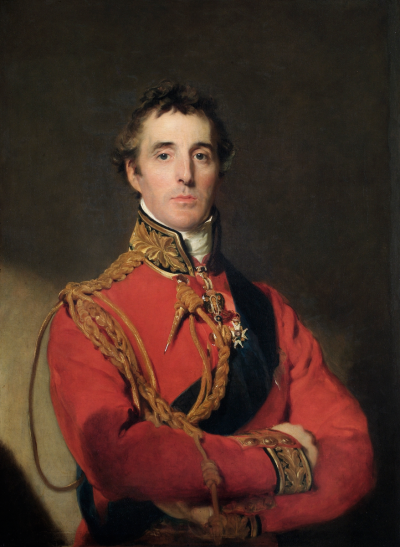In the siege of Badajoz (16 March 6 April 1812), also called the third siege of Badajoz, an Anglo-Portuguese Army under the Earl of Wellington (later the Duke of Wellington) besieged Badajoz, Spain, and forced the surrender of the French garrison. The siege was one of the bloodiest in the Napoleonic Wars and was considered a costly victory by the British, with some 4,800 Allied soldiers killed or wounded in a few short hours of intense fighting during the storming of the breaches as the siege drew to an end. Enraged at the huge number of casualties they suffered in seizing the city, the troops broke into houses and stores consuming vast quantities of alcohol with many of them then going on a rampage, threatening their officers and ignoring their commands to desist, and even killing several. It took three days before the men were brought back into order. When order was restored, an estimated 200-300 civilians had been killed or injured.
Arthur Wellesley, 1st Duke of Wellington, (1 May 1769 – 14 September 1852) was an Anglo-Irish soldier and Tory statesman who was one of the leading military and political figures of 19th-century Britain, serving twice as prime minister of the United Kingdom. He is among the commanders who won and ended the Napoleonic Wars when the coalition defeated Napoleon at the Battle of Waterloo in 1815.
Wellesley was born in Dublin into the Protestant Ascendancy in Ireland. He was commissioned as an ensign in the British Army in 1787, serving in Ireland as aide-de-camp to two successive lords lieutenant of Ireland. He was also elected as a member of Parliament in the Irish House of Commons. He was a colonel by 1796 and saw action in the Netherlands and in India, where he fought in the Fourth Anglo-Mysore War at the Battle of Seringapatam. He was appointed governor of Seringapatam and Mysore in 1799 and, as a newly appointed major-general, won a decisive victory over the Maratha Confederacy at the Battle of Assaye in 1803.
Wellesley rose to prominence as a general during the Peninsular campaign of the Napoleonic Wars, and was promoted to the rank of field marshal after leading the allied forces to victory against the French Empire at the Battle of Vitoria in 1813. Following Napoleon's exile in 1814, he served as the ambassador to France and was granted a dukedom. During the Hundred Days in 1815, he commanded the allied army which, together with a Prussian Army under Blücher, defeated Napoleon at Waterloo. Wellington's battle record is exemplary; he ultimately participated in some 60 battles during the course of his military career.
Wellington is famous for his adaptive defensive style of warfare, resulting in several victories against numerically superior forces while minimising his own losses. He is regarded as one of the greatest defensive commanders of all time, and many of his tactics and battle plans are still studied in military academies around the world. After the end of his active military career, he returned to politics. He was twice British prime minister as a member of the Tory party from 1828 to 1830 and for a little less than a month in 1834. He oversaw the passage of the Roman Catholic Relief Act 1829, but opposed the Reform Act 1832. He continued as one of the leading figures in the House of Lords until his retirement and remained Commander-in-Chief of the British Army until his death.

1812Apr, 6
British forces under the command of the Duke of Wellington assault the fortress of Badajoz. This would be the turning point in the Peninsular War against Napoleon-led France.
Choose Another Date
Events on 1812
- 27Feb
Manuel Belgrano
Argentine War of Independence: Manuel Belgrano raises the Flag of Argentina in the city of Rosario for the first time. - 26Mar
Gerrymander
A political cartoon in the Boston Gazette coins the term "gerrymander" to describe oddly shaped electoral districts designed to help incumbents win reelection. - 24Jun
French invasion of Russia
Napoleonic Wars: Napoleon's Grande Armée crosses the Neman river beginning the invasion of Russia. - 12Jul
Upper Canada
The American Army of the Northwest briefly occupies the Upper Canadian settlement at what is now at Windsor, Ontario. - 7Sep
Battle of Borodino
French invasion of Russia: The Battle of Borodino, the bloodiest battle of the Napoleonic Wars, was fought near Moscow and resulted in a French victory.

 English
English  español
español  français
français  português
português  русский
русский  العربية
العربية  简体中文
简体中文 